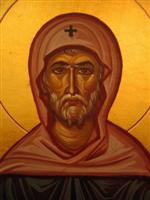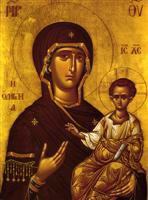 In ancient Greece a shrine dedicated to the pagan god, Apollo, stood at Delphi. People seeking answers to questions from the god would travel to the shrine and ask the oracle, a priestess of Apollo, who would answer the question on behalf of the god. A man named Chaerephon once asked the oracle, “Who is the wisest man?” She replied that Socrates was the wisest man.
In ancient Greece a shrine dedicated to the pagan god, Apollo, stood at Delphi. People seeking answers to questions from the god would travel to the shrine and ask the oracle, a priestess of Apollo, who would answer the question on behalf of the god. A man named Chaerephon once asked the oracle, “Who is the wisest man?” She replied that Socrates was the wisest man.Upon hearing the oracle's answer from his friend, Socrates was puzzled. Knowing that he was not the wisest man, but unwilling to accept that the god lied, Socrates set out to talk to others with reputations for wisdom. By talking to these wise men he hoped to discover how he could possibly be the wisest man. After speaking with them, Socrates discovered that even though they possessed great reputations for being wise and they certainly saw themselves as being wise, they really weren’t wise at all. He found that they didn’t know much, but they thought they knew much more than they actually did. They had deceived themselves by overestimating their own wisdom. On the other hand, Socrates didn’t know much either, but he realized how little he knew. Therefore, Socrates concluded that he was indeed the wisest man because he recognized his own ignorance (Plato, The Apology).
If we understand wisdom the way Socrates did, we can be rather unwise ourselves. We are ignorant of more than we know, but we can often overestimate our wisdom. Recognizing our own ignorance is humbling, but when we think we know more than we actually do we can become quite arrogant. Everyone around us seems less intelligent, wise, and knowledgeable than we are. We can even become so arrogant that we judge our Creator, the source of all knowledge and wisdom, as possessing less wisdom and knowledge than we do. How can anyone actually think that he or she has a more complete and coherent understanding of reality than the One who creates reality out of nothing? In our ignorance, we can question whether God is really infinitely holy, powerful, loving, merciful, and compassionate. How can we, who are sinners full of self-righteous pride, hedonistic lust, selfish ambition, and spiritual laziness, judge the true and living God? We are blindly arrogant and incredibly unaware of our own empty ignorance.
Challenging God is sometimes an emotional reaction to our personal pain and inability to understand things that happen in our lives. When we don’t understand why we are hurting or life doesn’t seem to make sense and we can’t find anyone around us to blame, we direct our anger, frustration, and anxiety toward our Creator. Consider the story of Job. During a period of tremendous suffering, Job began to make accusations against God.
God answered him,
“Who is this that darkens counsel by words without knowledge? Gird up your loins like a man, I will question you, and you shall declare to me. Where were you when I laid the foundations of the earth? Tell me, if you have understanding. Who determined its measurements—surely you know! Or who stretched the line upon it? On what were its bases sunk, or who laid its cornerstone, when the morning stars sang together, and all the sons of God shouted for joy? Or who shut in the sea with doors, when it burst forth from the womb; when I made clouds its garment, and thick darkness its swaddling band, and prescribed bounds for it, and set bars and doors, and said, ‘Thus far shall you come, and no farther, and here shall your proud waves be stayed?’ Shall a faultfinder contend with the Almighty? He who argues with God, let him answer it.”
Then Job, realizing his own ignorance, responded,
“Behold, I am of small account; what shall I answer thee? I lay my hand on my mouth. I have spoken once, and I will not answer; twice, but I will proceed no further.”
God continued,
“Will you put me in the wrong? Will you condemn me that you may be justified? Have you an arm like God, and can you thunder with a voice like his?”
Job answered,
“I know that thou canst do all things, and that no purpose of thine can be thwarted. ‘Who is this that hides counsel without knowledge?’ Therefore I have uttered what I did not understand, things too wonderful for me, which I did not know. ‘Hear, and I will speak; I will question you, and you declare to me.’ I had heard of thee by the hearing of the ear, but now my eye sees thee; therefore I despise myself, and repent in dust and ashes.” (Job 38.1-11, 40.2-9, 42.1-8, RSV)
In the end, Job realized how ignorant and arrogant he had been to challenge God. He repented, trading self-righteousness for humility, and proceeded to live a long, fulfilled life.
Questioning God or blaming Him for whatever happens in the world that we don’t understand doesn’t lead us to greater wisdom and knowledge or make us more pure, loving, spiritually healthy people. Arrogance actually shuts our hearts and minds to God’s grace, love, and wisdom. It causes us to ignore our own sinfulness and turns our hearts against the only One who can help us. A child who rebels against her loving parents, questions their authority, rejects their instructions, and accuses them of not understanding her or desiring what is best for her will not likely grow closer to her parents as long as these attitudes are kept in her heart. She will grow inward and distant from them. The child who obeys her parents in humility, even without understanding why they give certain instructions, confides in them, and genuinely loves them is likely to build a strong, enduring relationship and develop a way of thinking and understanding the world shaped by their views. Instead of arrogantly challenging God like an immature child challenges her parents, we can improve our knowledge of ourselves and our comprehension of reality by loving God with our hearts, obeying the teachings He has given to us for our benefit, and nurturing our relationship with Him, our compassionate Father.
Rather than trying to figure out reasons things happen in the world, we can benefit from humbly embracing the divine mystery of the One who is incomprehensible and uncontainable. Through our intimate spiritual communion, God transforms our hearts so that we are capable of understanding reality from the divine perspective, a perspective that often makes little sense to secular culture. In a corrupted, dysfunctional world, “common sense,” the sense held in common among people influenced by the world, is not necessarily good sense. “Let no one deceived himself. If any one among you thinks that he is wise in this age, let him become a fool that he may become wise. For the wisdom of this world is folly with God. For it is written, 'He catches the wise in their craftiness,' and again, 'The Lord knows that the thoughts of the wise are futile'” (1 Cor. 3.18-21, RSV).
How do we escape from the arrogance in our hearts that causes us to challenge, accuse, and question the One who loves us? How do we humbly embrace the mystery of the Holy Trinity and commune in a relationship of love and trust with the living God, the source all wisdom the knowledge? We accomplish these things by living the dynamic spiritual life within the Church, the mystical community of Christ’s disciples. The Church is the temple of God where the Spirit of God dwells. She is the guardian and preserver of the Truth, the one who proclaims the Truth to the world, and who lives the Truth within the world. God created the Church, reveals Himself to her, dwells within her, and guides her every day of her life. Within the Church we find Holy Tradition, the Faith passed down to us from the Apostles, in its fullest form. The Holy Scripture, revealing the Truth through human language, as well as the correct interpretation of Scripture, are present within the Church. The Holy Icons, revealing the Truth visually through art, are kept within the Church. The Holy Mysteries through which we mystically experience the Truth remain inseparable from our life in the Church. Within the Church we pray, both individually and together as one body, one temple. A true theologian in not a philosopher, but one who prays, communing and communicating with God, who molds our hearts like wax and imparts wisdom to those who seek it.
The complete spiritual way of life that leads into the depths of divine spirituality is the life of the Orthodox Christian Church. Through the Church, built upon the Apostles, we come to the knowledge of the Truth and acquire spiritual wisdom, not through intellectual philosophical ideas, but through the Spirit. As St. Paul said of the Apostles, “Yet among the mature we do impart wisdom, although it is not the wisdom of this age or of the rulers of this age, who are doomed to pass away. But we impart a secret and hidden wisdom of God, which God decreed before the ages for our glorification. None of the rulers of this age understood this; for if they had, they would not have crucified the Lord of glory. But, as it is written, ‘What no eyes has seen, nor ear heard, nor the heart of man conceived, what God has prepared for those who love him,’ God has revealed to us through the Spirit” (1 Cor. 2.6-10, RSV). The word “orthodox” in the term "Orthodox Christianity" means, in part, “correct belief” or “right faith.” As Orthodox Christians, we hold to the original Christian faith that has endured for two thousand years, but being an Orthodox Christian is not just about being right, that is, intellectually knowing the right doctrines. Knowledge that remains in the mind alone without descending into the heart can puff up our pride. However, when Truth abides in the heart and is embodied as a lifestyle in the world, it produces humility. If we have humble hearts, the Spirit can teach us, shape our perceptions, and grant us wisdom.
Through our life in the Church, a life involving a dynamic relationship with the One who loves us, we can learn to better understand what our Creator has revealed to us and has entrusted to us. We can also learn to confidently accept the indescribable mystery that remains beyond our human comprehension. Let’s keep this psalm of King David in our hearts so that we may recognize our ignorance and find peace, tranquility, and wisdom through our communion with the Holy Trinity:
O LORD, my heart is not lifted,
My eyes are not raised too high;
I do not occupy myself with things
Too great and too marvelous for me.
But I have calmed and quieted my soul,
Like a child that is quieted is my soul.
O Israel, hope in the LORD
From this time forth and forevermore.
(Psalm 130/131, RSV)
Copyright © 2006 by Dana S. Kees. Photo copyright © 2005 by Dana S. Kees.




